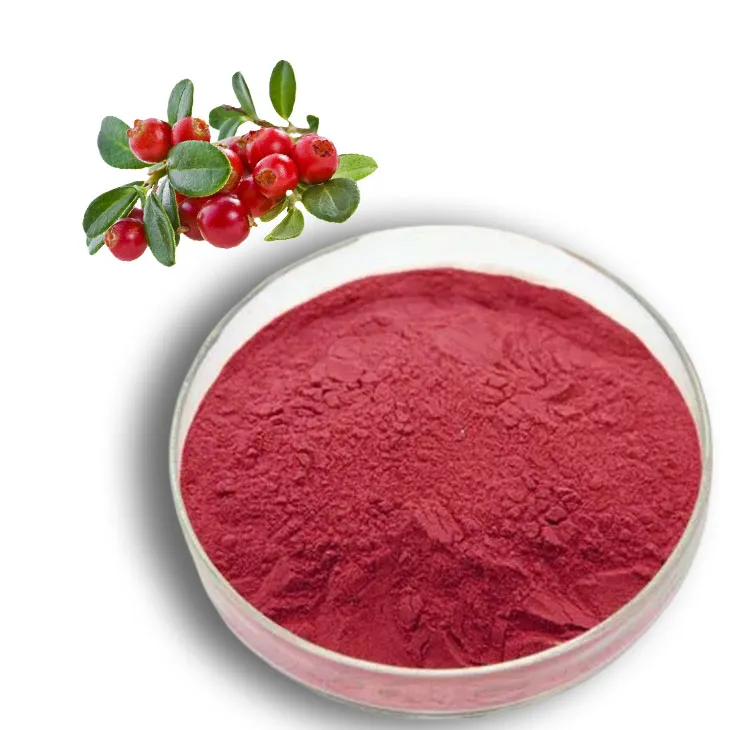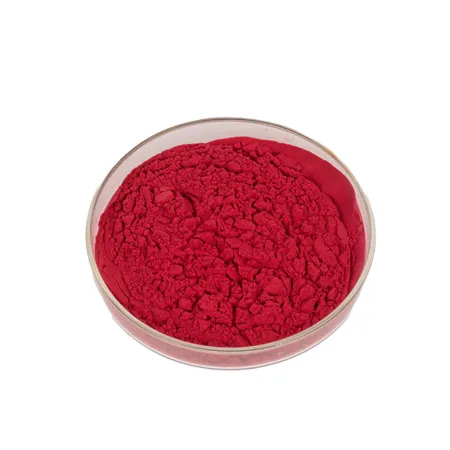- 0086-571-85302990
- sales@greenskybio.com
Is cranberry extract beneficial for diabetes? Are these all safe and suitable for diabetic patients?
2024-11-12

1. Introduction
Diabetes is a chronic metabolic disorder that affects millions of people worldwide. Management of diabetes often involves a combination of lifestyle changes, medication, and sometimes, the use of natural remedies. Cranberries, native to North America, have been long - associated with various health benefits. Cranberry Extract, in particular, has gained attention in the context of diabetes. This article aims to explore whether Cranberry Extract is beneficial for diabetes and its safety for diabetic patients.

2. Cranberry and Its Nutritional Composition
Cranberries are rich in a variety of nutrients. They contain significant amounts of vitamin C, which is an antioxidant that helps protect cells from damage. They also have dietary fiber, which can play a role in regulating blood sugar levels by slowing down the absorption of carbohydrates. Additionally, cranberries are a source of flavonoids and other phenolic compounds. These bioactive substances are thought to contribute to the potential health - promoting effects of cranberries.

3. Scientific Research on Cranberry Extract and Diabetes
3.1. Blood Glucose Regulation
Some studies have suggested that cranberry extract may have an impact on blood glucose levels. In animal models of diabetes, cranberry extract has been shown to improve glucose tolerance. This may be due to its effect on insulin sensitivity. However, the results in human studies are less conclusive. While some small - scale human trials have reported a mild reduction in blood glucose levels with cranberry extract supplementation, larger and more comprehensive studies are needed to confirm these findings.
3.2. Antioxidant Effects
Diabetes is associated with increased oxidative stress. The antioxidants present in cranberry extract, such as flavonoids, may help counteract this oxidative stress. By reducing oxidative stress, cranberry extract could potentially protect pancreatic beta - cells, which are responsible for insulin production. In theory, this could contribute to better glycemic control in diabetic patients. However, more research is required to establish a direct link between cranberry extract's antioxidant effects and improved diabetes management.

4. Possible Mechanisms of Action
4.1. Influence on Insulin Signaling
Cranberry extract may interact with the insulin signaling pathway. It could enhance the activity of insulin receptors or improve the intracellular signaling mechanisms related to insulin. This would result in better uptake of glucose by cells, thereby reducing blood glucose levels. However, the exact molecular mechanisms underlying this potential interaction are not fully understood and require further investigation.
4.2. Anti - inflammatory Effects
Chronic inflammation is often present in diabetes. Cranberry extract has been shown to possess anti - inflammatory properties in other contexts. It may reduce inflammation in adipose tissue, liver, and other organs involved in glucose metabolism. By reducing inflammation, cranberry extract could potentially improve insulin sensitivity and glucose homeostasis. But again, more research is needed to confirm these effects specifically in diabetic patients.

5. Safety of Cranberry Extract for Diabetic Patients
5.1. General Safety
Cranberry extract is generally considered safe for most people when consumed in moderation. However, some individuals may experience side effects such as stomach upset, diarrhea, or allergic reactions. Diabetic patients should be cautious, especially if they are taking other medications, as cranberry extract may interact with certain drugs.
5.2. Drug Interactions
Cranberry extract has the potential to interact with medications used to treat diabetes, such as oral hypoglycemic agents and insulin. It may enhance the effects of these medications, leading to hypoglycemia (low blood sugar). For example, if a diabetic patient is taking metformin and also consumes cranberry extract, there is a risk of the blood glucose level dropping too low. Therefore, it is crucial for diabetic patients to consult their healthcare provider before starting cranberry extract supplementation.
6. Considerations for Diabetic Patients
- Consult a healthcare provider: Diabetic patients should always consult their doctor or a registered dietitian before adding cranberry extract to their regimen. This is especially important if they are on medications or have other health conditions.
- Quality and dosage: If a diabetic patient decides to use cranberry extract, they should ensure that they are using a high - quality product. The appropriate dosage also needs to be determined, as excessive consumption may lead to adverse effects.
- Monitor blood glucose levels: Regular monitoring of blood glucose levels is essential when starting cranberry extract supplementation. This will help detect any changes in blood sugar, whether it is a beneficial reduction or a potentially dangerous drop.
7. Conclusion
Cranberry extract shows some potential benefits for diabetes in terms of blood glucose regulation and antioxidant and anti - inflammatory effects. However, the evidence from human studies is not yet conclusive. While cranberry extract is generally safe for most people, diabetic patients need to be cautious due to potential drug interactions and the risk of hypoglycemia. More research, especially large - scale clinical trials, is needed to fully understand the role of cranberry extract in diabetes management and to ensure its safe and effective use for diabetic patients.
FAQ:
1. What are the potential benefits of cranberry extract for diabetes?
Cranberry extract may have several potential benefits for diabetes. Some studies suggest that it could help in blood sugar control. It may contain antioxidants that can reduce oxidative stress in the body, which is often elevated in diabetic patients. Additionally, cranberry extract might have anti - inflammatory properties, which could be beneficial as diabetes is associated with chronic inflammation. However, more research is needed to fully understand and confirm these potential benefits.
2. How does cranberry extract affect blood sugar levels?
The exact mechanism by which cranberry extract affects blood sugar levels is not fully understood. It may interact with enzymes involved in carbohydrate metabolism or influence insulin sensitivity. Some components in cranberry extract might stimulate cells to take up glucose more effectively, similar to how insulin works. But again, this is still an area of ongoing research and more studies are required to clarify the precise pathways.
3. Are there any side effects of cranberry extract for diabetic patients?
For most diabetic patients, cranberry extract is generally well - tolerated. However, some people may experience side effects such as stomach upset, diarrhea, or allergic reactions. Cranberries are relatively high in oxalates, which could potentially lead to kidney stone formation in susceptible individuals. Diabetic patients with pre - existing kidney problems should be especially cautious. It's always advisable to consult a healthcare provider before starting any new supplement.
4. Can cranberry extract replace diabetes medications?
No, cranberry extract cannot replace diabetes medications. While it may offer some potential benefits in diabetes management, it is not a substitute for prescribed medications. Diabetes medications are specifically designed to regulate blood sugar levels, and their effectiveness has been proven through extensive clinical trials. Cranberry extract should be seen as a complementary approach, and any changes to the diabetes treatment plan should be made under the guidance of a healthcare professional.
5. How much cranberry extract is safe for diabetic patients?
There is no one - size - fits - fits - all answer to how much cranberry extract is safe for diabetic patients. It depends on various factors such as the individual's overall health, other medications they are taking, and their specific diabetic condition. In general, it's best to start with a small dose and gradually increase it while monitoring for any adverse effects. It is also crucial to follow the recommended dosages on the product label and consult a healthcare provider for personalized advice.
Related literature
- The Potential Role of Cranberries in Diabetes Management"
- "Cranberry Extract and Its Impact on Diabetic Health: A Review"
- "Safety and Efficacy of Cranberry Supplements in Diabetic Patients"
- ▶ Hesperidin
- ▶ citrus bioflavonoids
- ▶ plant extract
- ▶ lycopene
- ▶ Diosmin
- ▶ Grape seed extract
- ▶ Sea buckthorn Juice Powder
- ▶ Beetroot powder
- ▶ Hops Extract
- ▶ Artichoke Extract
- ▶ Reishi mushroom extract
- ▶ Astaxanthin
- ▶ Green Tea Extract
- ▶ Curcumin Extract
- ▶ Horse Chestnut Extract
- ▶ Other Problems
- ▶ Boswellia Serrata Extract
- ▶ Resveratrol Extract
- ▶ Marigold Extract
- ▶ Grape Leaf Extract
- ▶ blog3
-
Cranberry Plants and Skin - care Products.
2024-11-12
-
Lemon Juice Powder
2024-11-12
-
Marigold Extract
2024-11-12
-
Bamboo Leaf extract
2024-11-12
-
Nettle Root Extract
2024-11-12
-
Ginger Extract
2024-11-12
-
Aguaje Extract
2024-11-12
-
Hawthorn powder
2024-11-12
-
Sophora Flavescens Root Extract
2024-11-12
-
Europen Bilberry Extract
2024-11-12
-
Lavender Extract
2024-11-12





















